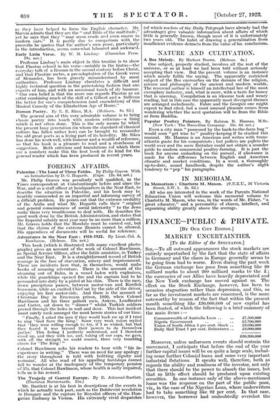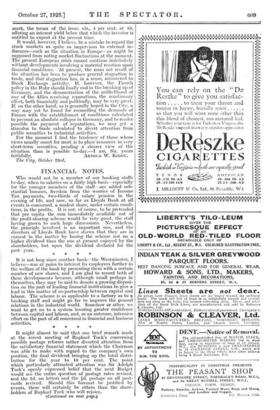FINANCE-PUBLIC & PRIVATE.
[BY OUR CITY EDITOR.]
MARKET UNCERTAINTIES.
[To the Editor of the SPECTATOR.] SIR,—To all outward appearances the stock markets are entirely unperturbed by the fact that the state of affairs in Germany and the chaos in Europe generally seems to be going from bad to worse. Even during the past week the German exchange has gone from something like 20 milliard marks to about 200 milliard marks to the E ; the currencies of our Allies have heavily depreciated and the New York exchange has moved against us. The effect on the Stock Exchange, however, has been to occasion stagnation rather than depression, and this, so far as the investment markets are concerned, is the more noteworthy by reason of the fact that within the present month something like £30,000,000 of new capital has been floated, of which the following is a brief summary of the main items :- Commonwealth of Australia Loan .. £7,500,000
Nigeria Government • • • • 25,700,000 Union of South Africa 5 per cent. Stock .. £9,000,000
Daily Mail Trust 7 per cent. Debentures .. £8,000,000
£30.200.000
Moreover, unless unforeseen events should restrain the movement, I anticipate that before the end of the year further capital issues will be on quite a large scale, includ- ing some further Colonial loans and some very important industrial flotations. It speaks well, therefore, both as regards the ability and readiness of the investor, not only that there should be the power to absorb the issues, but that so little effect should be produced upon existing securities. In one instance only of the above-mentioned loans was the response on the part of the public poor, viz., in the case of the Nigerian Loan, where underwriters had to take something like 92 per cent. In that case, however, the borrower had undoubtedly overshot the mark, the terms of the issue, viz., 4 per cent. at 88, offering an interest yield below that which the investor is entitled to expect at the present time. It would, however, I believe, be a mistake to regard the stock markets as quite so impervious to external in- fluences—such as the situation in Europe—as might be supposed from noting market fluctuations at the moment. The present European crisis cannot continue indefinitely without developments involving a material reaction upon financial conditions. At present, the main net result of the situation has been to produce general stagnation in trade, and that stagnation has, in a sense, ministered to Stock Exchange activity. If, however, the French policy in the Ruhr should finally end in the breaking up of Germany, and the demonstration of the unlikelihood of any of the Allies receiving reparations, the reactionary effect, both financially and politically, may be very great. If, on the other hand, as is generally hoped in the City, a way may yet be found for reconciling the demands of France with the establishment of conditions calculated to prevent an absolute collapse in Germany, and to render possible the payment of reparations, we may get a stimulus to trade calculated to divert attention from public securities to industrial activities.
For the moment I find the tendency of those whose views usually count for most is to place resources in very short-term securities, pending a clearer view of the situation than is possible to-day.—I am, Sir, yours
The City, October 23rd.















































 Previous page
Previous page